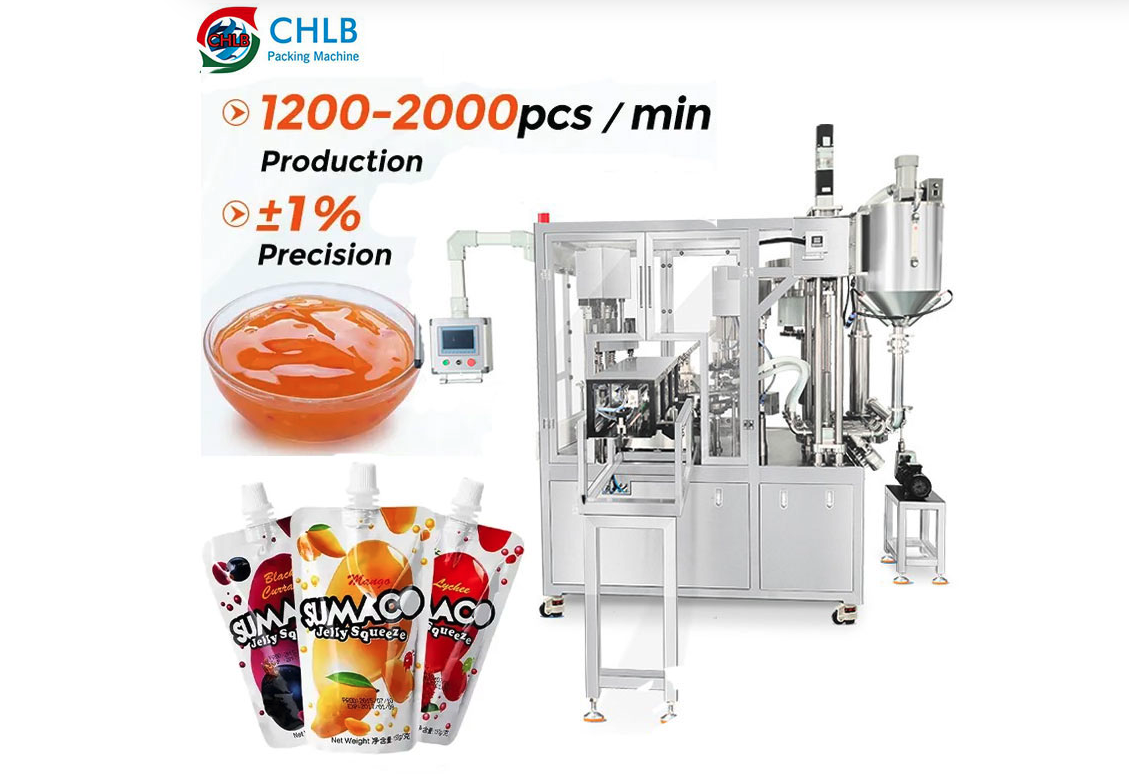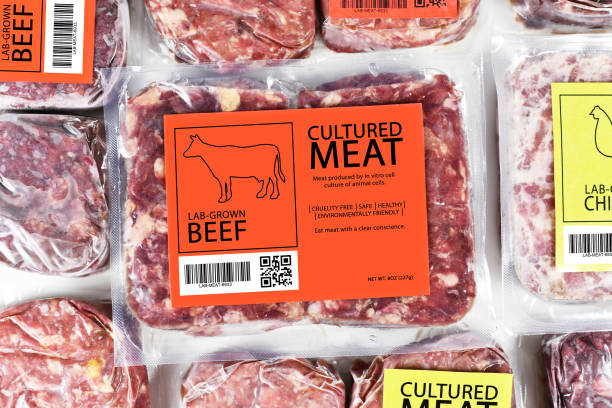En la industria alimentaria en rápido movimiento actual, la máquina de embalaje adecuada puede moldear la forma en que crece su negocio. Ya sea que dirija una fábrica en crecimiento o administre operaciones a gran escala, el equipo adecuado puede aumentar la velocidad, reducir el desperdicio, y mejorar el atractivo del producto. Esta guía le muestra cómo seleccionar máquinas que realmente se ajusten a sus objetivos comerciales..
Tipos de máquinas envasadoras de alimentos
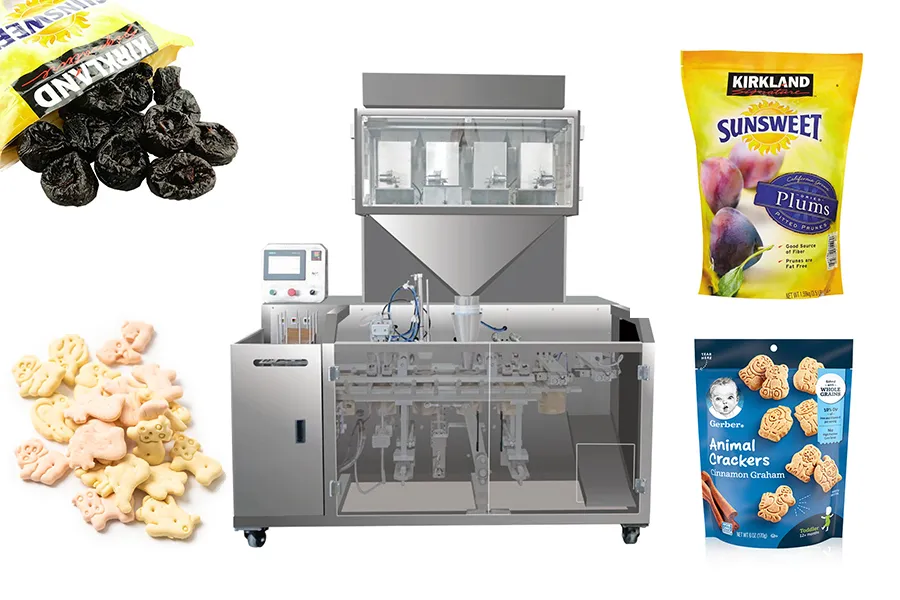
Sello de llenado de formulario vertical (VFFS) Máquinas
Las máquinas VFFS forman bolsas a partir de un rollo de película, llenarlos con producto, y sellarlos verticalmente. Son muy versátiles, capaz de producir bolsas tipo almohada, bolsas con sello de tres lados, o paquetes con fuelle. Estas máquinas suelen funcionar a velocidades de 60 a 200 paquetes por minuto., dependiendo del modelo y tipo de producto. Su diseño vertical estabiliza el producto durante el llenado., reduce los derrames, y asegura calidad de embalaje constante. Puede ajustar fácilmente el tamaño de la bolsa y las configuraciones de sellado, haciéndolos adecuados para una amplia gama de granulares, en polvo, y pequeños productos de snack.
Productos aplicables:
Productos granulados: arroz, frijoles, azúcar
Polvos: café, harina, especias
Pequeños bocadillos: nueces, frutos secos
Envoltura de flujo horizontal (HFFS) Máquinas
Las máquinas HFFS envuelven productos horizontalmente a lo largo de un transportador en película continua, Mantener el producto estable durante el proceso.. Manejan de manera eficiente artículos frágiles o de formas irregulares., Proporcionar sellos uniformes y embalajes de aspecto profesional.. Las velocidades de funcionamiento pueden alcanzar hasta 400 unidades por minuto, mientras que el manejo suave reduce el daño al producto. El uso de la película es eficiente, y las máquinas admiten múltiples formatos de envoltura, permitiéndole cambiar entre SKU con un tiempo de inactividad mínimo. Esto los hace ideales para mantener la integridad del producto y la calidad de la presentación en producción de gran volumen..
Productos aplicables:
productos horneados: galletas, rebanadas de pan
Confitería: barras de chocolate, dulce
Sándwiches y artículos delicados
Máquinas de llenado
Las máquinas llenadoras suministran porciones precisas de líquidos, semilíquidos, o polvos en recipientes, garantizar la precisión y reducir el desperdicio. Las llenadoras de pistón se utilizan para líquidos y semilíquidos., mientras que las llenadoras de tornillo manejan polvos. Las máquinas de alta calidad mantienen una variación de llenado de ±0,5%, protegiendo sus márgenes y garantizando el cumplimiento de las normas de etiquetado. Pueden adaptarse a diferentes tamaños y formas de contenedores., y su rapidez, El funcionamiento constante le ayuda a mantener la productividad y, al mismo tiempo, garantiza una calidad uniforme del producto..
Productos aplicables:
Líquidos: salsas, jugos, sopas
Semilíquidos: yogur, cremas, pasado
Polvos: café, polvos de proteína, especias
Máquinas combinadas multifunción
Las máquinas multifunción integran el conformado, relleno, caza de focas, y etiquetado en una sola línea, optimizando el flujo de trabajo y ahorrando espacio. Manejan múltiples formatos de productos de manera eficiente y permiten cambios rápidos., reducir el tiempo de inactividad entre lotes. Su versatilidad garantiza una calidad de salida constante en diferentes productos., mientras que la automatización mejora la confiabilidad y reduce los requisitos de mano de obra. Estas máquinas son ideales si planea empaquetar varios artículos sin invertir en múltiples sistemas separados..
Productos aplicables:
Productos con formatos variados que requieren bolsa., bandeja, o embalaje en bolsa
Líneas con frecuentes cambios de producto
Bolsa, Caja, y máquinas envasadoras de bandejas
Estas máquinas están diseñadas para embalaje secundario o rígido., tales como bolsas, cartón, y bandejas. Selladoras de bandejas con envasado en atmósfera modificada (MAPA) puede extender la vida útil de 2 a 3 veces, Preservar el color del producto., textura, y sabor. Las máquinas mejoran la presentación y protegen los productos durante el almacenamiento y transporte., al mismo tiempo que permite un sellado consistente y una operación de alta velocidad. Son particularmente útiles cuando la apariencia y la vida útil del producto son fundamentales para la satisfacción del cliente..
Productos aplicables:
Comidas preparadas, alimentos congelados, productos delicatessen
Cajas de snacks y cartones de confitería
Artículos a base de tazas: yogur, pudín, luces cortas
Vacuum and Modified Atmosphere Packaging (MAPA) Máquinas
Vacuum and MAP machines preserve product freshness by controlling the air inside the package. Vacuum machines remove air to slow spoilage, while MAP replaces air with protective gases such as nitrogen or CO₂, maintaining product appearance and extending shelf life. These machines enhance storage stability and reduce the need for chemical preservatives. They are particularly suitable for products that require high freshness standards and consistent presentation during transportation and retail display.
Productos aplicables:
Vacío: carnes, mariscos, quesos
MAPA: comidas preparadas, ensaladas, delicate fresh products
How to Choose the Best Food Packaging Machine
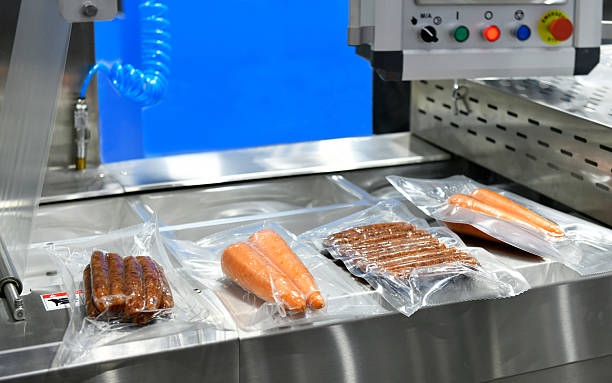
Matching Machines to Your Products
Product Form and Texture
Your product’s form and texture determine which machine will work best. Los productos granulados como arroz o frijoles se procesan de manera eficiente en máquinas VFFS, mientras que los polvos o artículos frágiles pueden requerir llenadores de barrena o pesadoras para garantizar un porcionado consistente y una rotura mínima.. Los líquidos y semilíquidos necesitan sistemas basados en bombas o pistones para una dosificación precisa. Elegir la máquina equivocada puede provocar derrames, rellenos inconsistentes, o productos dañados.
Estilo y material del paquete
Pregúntate: Quieres bolsas de almohadas, bolsas de pie, bandejas rígidas, o paquetes al vacío? Cada formato de packaging tiene un conformado específico, caza de focas, y requisitos de manipulación. Una bolsa vertical con cremallera exige herramientas especializadas y sellado de precisión, mientras que un simple sobre plano puede manipularse con equipo estándar. Seleccionar una máquina que coincida con el material de embalaje elegido garantiza sellos fuertes, desperdicio mínimo de película, y presentación consistente.
Factores de rendimiento y capacidad
Velocidad y rendimiento de la máquina
Al elegir una máquina, considere cuántas unidades puede producir de manera confiable por hora. Las máquinas de mayor velocidad no siempre son mejores; deben coincidir con su tipo de producto y diseño de línea. Quiere una máquina que mantenga una velocidad constante sin sacrificar la calidad del producto ni aumentar las tasas de error..Precisión de llenado y sellado
El porcionado y sellado precisos son cruciales. Una máquina que ofrece rellenos precisos reduce el desperdicio de material y evita el exceso- o paquetes insuficientemente llenos. Busque máquinas con tolerancias estrictas (normalmente ±0,5%) para garantizar el cumplimiento y mantener una experiencia consistente para el cliente..Capacidad de producción
Evalúe las capacidades de producción diaria y mensual de la máquina.. Debería manejar sus volúmenes máximos sin ajustes constantes. Encima- o la falta de capacidad puede generar ineficiencias, extra labor, o tiempo de inactividad frecuente.Adaptabilidad y flexibilidad
La mejor máquina se adapta a las variaciones del producto manteniendo estable el rendimiento.. Las máquinas con diseños modulares o configuraciones programables le permiten cambiar el tamaño de las bolsas, formatos, o llenar pesas rápidamente, reducir el tiempo de inactividad y aumentar la eficiencia operativa.Necesidades de confiabilidad y mantenimiento
Una máquina de alto rendimiento sólo es valiosa si funciona de manera consistente. Elija equipos que sean fáciles de mantener, limpio, y solucionar problemas. Las máquinas confiables minimizan las paradas inesperadas y respaldan la producción continua.
Higiene & Estándares de seguridad
Material y construcción
Elija máquinas fabricadas con acero inoxidable apto para uso alimentario u otros materiales no corrosivos.. Superficies lisas, bordes redondeados, y las grietas mínimas reducen la acumulación de bacterias y facilitan la limpieza.. Esto garantiza que su línea de producción cumpla con los requisitos reglamentarios y proteja la calidad del producto..Limpieza y mantenimiento
Las máquinas diseñadas para un fácil desmontaje y una limpieza rápida ahorran tiempo y reducen el riesgo de contaminación. Busque funciones de lavado automatizadas o componentes modulares que permitan un saneamiento completo sin tiempos de inactividad prolongados..Seguridad del operador
Funciones de seguridad como paradas de emergencia, guardias protectoras, y los enclavamientos evitan accidentes durante el funcionamiento. Una máquina que prioriza la seguridad del operador también minimiza las interrupciones de producción causadas por lesiones o violaciones de seguridad..Cumplimiento de estándares
Asegúrese de que la máquina cumpla con los estándares internacionales de higiene y seguridad., como ISO 22000, APPCC, o regulaciones locales relevantes. El cumplimiento le ayuda a evitar multas, recuerda, o rechazo del producto, y asegura a sus clientes que sus productos se manipulan de forma segura.Control del aire y el medio ambiente
Para envasado al vacío o MAP, Los sistemas de filtración y flujo de aire controlados previenen la contaminación y mantienen la frescura del producto.. Las máquinas con un sellado adecuado y controles ambientales protegen tanto el producto como el proceso de envasado..
Soporte posventa
Soporte postventa confiable es un factor clave a la hora de elegir una máquina envasadora de alimentos. Deberías trabajar con proveedores como CHLB, que ofrecen asistencia técnica rápida, incluyendo guía remota o servicio in situ. La resolución rápida de problemas puede evitar que pequeños problemas provoquen costosos tiempos de inactividad. Compruebe que los repuestos sean fáciles de obtener y se entreguen con prontitud, Garantizar que su línea de producción siga funcionando sin problemas..
La formación y la documentación son igualmente importantes. Busque proveedores que proporcionen manuales claros, tutoriales en vídeo, o sesiones de capacitación práctica para sus operadores y personal de mantenimiento. El personal bien capacitado puede operar las máquinas de manera eficiente, reducir errores, y extender la vida útil del equipo.
Los contratos de garantía y servicio también influyen en su decisión. Una garantía más larga y un acuerdo de servicio integral protegen su inversión y reducen el riesgo. Asociarse con proveedores que priorizan el soporte a largo plazo le permite escalar, mejora, o modifique su línea de embalaje sin interrupciones, asegurando productividad y confiabilidad constantes.
¿Por qué trabajar con CHLB??
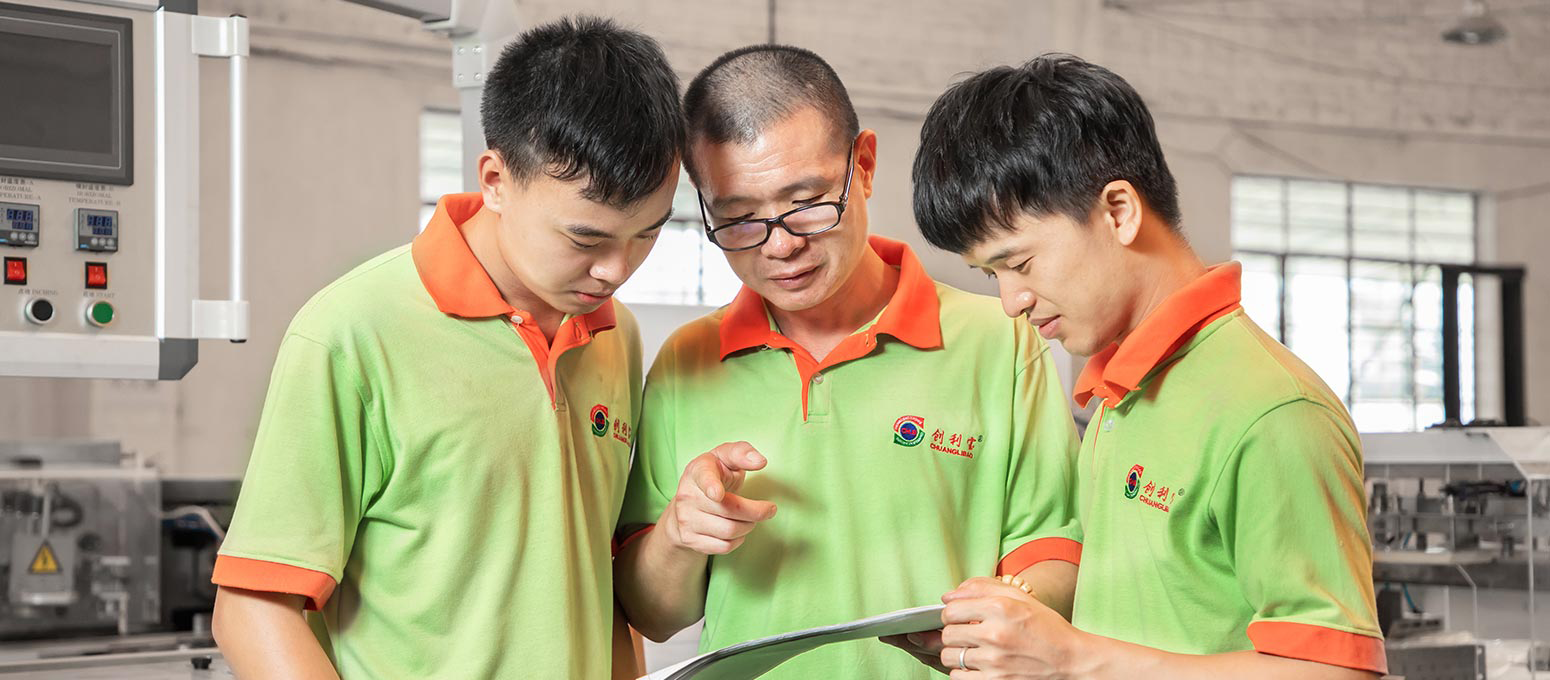
Como fabricante especializado en máquinas de envasado de alimentos., CHLB comprende tanto los detalles de ingeniería como las realidades diarias del funcionamiento de una línea de envasado. Diseñamos nuestras máquinas para una fácil limpieza., cambios rápidos, y sellos confiables, para que dedique menos tiempo a solucionar problemas y más tiempo a producir. Nuestro equipo proporciona formación., piezas de repuesto, y un servicio receptivo para brindarle soporte mucho después de la instalación.
Si estás explorando tus opciones, CHLB ofrece una gama completa de máquinas de embalaje y soporte experto para empresas de todos los tamaños. Comuníquese con nuestro equipo para discutir sus productos., objetivos de producción, y presupuesto, y le ayudaremos a encontrar la solución más eficiente y confiable para su línea.


